- Home
- Gavin Chappell
Viking Revolt
Viking Revolt Read online
Viking Revolt
GAVIN CHAPPELL
Copyright © Gavin Chappell 2019
Cover art by Joridma
All rights reserved. No part of this book may be reproduced or transmitted in any form or by any electronic or mechanical means, including photocopying, recording or by any information retrieval system, without the written permission of the publisher and author, except where permitted by law.
The right of Gavin Chappell to be identified as the author of this work has been asserted by him in accordance with the Copyright, Designs and Patents Act 1988.
Map of Rogaland adapted from map by NordNordWest
Inset of Scandinavia by Tokle.
Interior and exterior images licensed under the Creative Commons Attribution-Share Alike 3.0 Unported license.
Published by Thor’s Stone Press 2019.
ISBN: 9781678932183
This book is a work of fiction and any similarities to actual persons and/or places are purely coincidental.
Rogaland in the reign of King Harald Finehair.
By the same author:
Vikings: Voyage to the Edge of the World
Starkad the Viking
Starkad the Outcast
Starkad the Old
The Blood Eagle
On Hadrian’s Secret Service
Murder in Hadrian’s Villa
The Hadrian Legacy
Our Man in Alexandria
The Games of Hadrian: The Gladiator Gambit
The Games of Hadrian: The Archimedes Stratagem
The Kingdom that Rome Forgot
The Londinium File
The Man Who Sold the Roman Empire
—1—
The fells rose like the jaws of a trap. Mist hung in the keen, cold air. Pine woods swathed the further slopes and their resin scent reached him as he disembarked from the skiff. From nearer by came a reek of charred wood and rot. He dragged his boat above the tideline. When he began crossing over the springy grass that grew beyond the rocky strand, he discovered the source of the latter smell.
The steading had been burnt to the ground. Its charred timbers jutted from amidst overgrown fields. The curtains of mist stirred. Other than the moan of the wind, there was silence. Not a sound of man or beast.
As he crossed the strand, his booted foot struck something that turned under him, rolling a short way across the pebbles. Broken bones littered the ground, blackened flesh still adhering to the yellowing splinters. A few flies buzzed desultorily around the humped form of a carcass, half buried in the sand. He knelt and examined the grisly remains.
These were not the bones of men, he soon saw, but of cattle. Here was a half-buried skull with horns jutting from the brainpan. There was a cow’s hoof, detached from the rest of the carcass. Along the strand lay any number of other humped forms; butchered carcases, gnawed and worried by carrion eaters.
But scavengers were not responsible for this mass slaughter. No ravens or foxes would have driven cattle down to the strand to butcher them. This was the work of men.
He made his way inland, finding a muddy wallow that marked the path down which the cattle had been driven. It took him right past the burned buildings.
The garth was overgrown with nettles. Barns and byres and granaries stood ransacked. The hall had been half burnt, its roof shingles charred, the writhing carven serpents that ornamented its doorposts and lintel blackened, the bright paint that had once daubed them faded and bleached.
He halted in the middle of the garth, looking thoughtfully about him. All was silent and still. An air of deep melancholy hung over the scene. He saw no bodies of men or women, but it was clear that the place had been set on fire. He could picture it. Grim men with spears and axes in their hands standing watch at the doors while others set torches to the thatch, all of them waiting for the dwellers in the hall to break, to bolt out, only to meet a swift death on the spears of their attackers.
Returning to the hall, he saw no sign of dead men, women or children. Had the mysterious marauders allowed the folk to flee before they fired their hall? Absently, he ran his fingers down the blackened timber of the doorpost. The inside of the hall yawned, cold and empty, like the inside of a skull. Nothing was left. The attack must have come very suddenly. But there were other steadings further down the strand, and he had seen fishing boats out on the fjord. Had no one come to the hall dwellers’ aid?
A noise from behind him! He wheeled round, hand on the hilt of his sword, and a dark figure ducked back behind the byre.
He strode forwards, salt stained cloak swirling around him. ‘Who is that? Come out. I would speak with you!’
He halted and listened. No sounds were audible except the sigh of the wind and the distant crash of waves on the shore. Had he dreamed it? He had undoubtedly glimpsed a watcher, a man. Or had it been a man? It had been man sized, but it had moved strangely.
‘Come out,’ he called again, walking towards the byre. ‘I won’t hurt you. I only want to know what happened here.’
Reaching the byre, he turned the corner but saw nothing moving but the nettles waving in the breeze. He sniffed suddenly. A waft of some foul beast scent vexed his nostrils; then it was gone, vanished on the wind.
The overgrown fields sloped gently down to the strand. The fjord rolled blue grey beneath the bleak heavens, reaching as far as the cliffs on the far shore, which towered skywards, swathed in wood before becoming slopes of naked rock. He thought he saw cave mouths pockmarking those cliffs.
Glancing down at the mud he saw footprints. They were fresh. Coming this way moments ago he had seen nothing of them. He crouched down. They were the prints of bare feet. Whatever had been watching him had not worn any boots. Too poor? Or too bestial? Without looking up he called out again.
‘Were you here?’ he asked of the wind. ‘Were you here when men came from the sea? Are you a survivor?’
Only the wind’s sigh came in reply. He rose and walked back down to the strand.
He could do nothing here. What he had seen only confirmed the tidings that had come to the king’s hall. The steading, one of several royal estates in this district, had been ransacked, burnt, the folk killed or driven away. Men had come from the sea, fired the hall, butchered the herds, and departed with whatever they had come for.
The fjord was bare of ships, the vessel in which he had come having departed for the open sea before he reached the shore. But vikings could have come at any time, killed and looted, and departed into the tangle of islands before there were any reprisals. Even the greatest of trackers could hardly follow a trail across the salt water.
Smears of smoke rose into the sky. He halted, eying them curiously. For a moment he thought it might be more vikings, but soon he realised that what he saw was the smoke of hearth fires, rising above the trees that came down to the strand. He remembered the other steadings he had seen. He must go to them, he told himself, and question the folk. Surely they had seen or heard something. He would row down the coast until he reached the fields of another steading, then go ashore and speak with the farmer or lord whose lands they were.
Reaching the strand, he looked about in sudden dismay. Where was the skiff? He had hauled her up above the tideline so that she would not be carried out into the fjord if he left her too long. But he could see no sign of her—No! There she was, half sunk, in the waters off the strand!
Cursing, he ran to the water’s edge. Unbolting his sword he laid it on a rock, then waded out into the chill waves. Reaching the skiff, he seized hold of the sunken gunwale and tried to shift her. Straining his thews, he lugged the light craft back up to the cold sand. It took some time to move the sunken vessel unaided, but at last he hauled her onto the sand, then tipped her onto one side to empty her of wate
r.
The water leaked out of the hull easily enough. He saw why. Several strakes had been stove in by the blows of an axe.
Disgusted, he let go, and the wrecked skiff fell back with a thump to the strand. Dusting off his hands he looked around angrily. Who had done this deed? He was stranded now, unless he could borrow a vessel from one of his new neighbours.
Hearing more noises, he turned again to see the grasses swaying as if someone—or something—had vanished into them. Was it the figure he had seen before? He went to draw his sword, then cursed again as his groping fingers closed on nothing.
He had taken off his sword before wading out into the waters, left it on a rock. Scowling, he went back to the water’s edge. The sun gleamed from the clouds that roofed the sky, shining down on that bleak shore. But no rays glittered upon either the pommel of his sword or the buckle of his belt.
He remembered the sounds he had heard. Had his unseen foe stolen his sword? That blade had cost him a score of silver marks, and now he had thrown it away out of carelessness! What was worse, he was alone on this shore—alone but for someone or something that now had its claws on three feet of good Norse smith craft. He was unarmed, but for the short sax that hung at his side.
Surely his foe was a survivor of this attack from the sea. Perhaps a thrall, perhaps a youth, terrified out of his wits, living on amongst the ruins. He doubted the fellow knew how to wield a sword, or even had the strength to swing it. But the lad would know the ground, would know all the best hiding places...
Well, he would achieve nothing standing here deep in thought. The longer he waited, the further his foe would get. He strode inland, stepping between the sand-buried carcasses that dotted the beach.
Soon he reached the burnt out ruins. This time he came from a different angle, and as he approached his eye fell upon a large hummock almost bare of grass, and he went to look at it. If he know no better, he would say that it was a barrow, a freshly heaped barrow. Was this where the folk of the steading had been buried? But by who? Anyone who had cared enough to bury them with such dignity would not have left the steading in a state of ruin.
And what of the sword thief?
He made his way through the nettle thickets and entered the garth again. Everything was silent. He half turned at a padding from behind him, breathed in a waft of some foul stench, then something collided with his skull. Stars exploded in his mind, and he felt himself falling backwards, backwards, backwards…
He never seemed to hit the ground. He dropped forever into endless blackness…
Rain fell from grey skies. Clouds rolled and roiled, disgorging their contents in a never-ending cascade. The earth turned to mud. He stared dazedly up into the sky, numbly wondering why he did so. His mouth was dry despite the downpour that had woken him, and his brow ached, throbbed, pounded.
As he reached a numb hand to soothe his bruised brow, sickness surged over him, and instantly he was on his hands and knees, spewing reeking vileness onto the mud. His belly ached, his eyes swam, his head throbbed.
He rose unsteadily, grimacing at the puddle of vomit, clinging to a burnt hall post for support, and gazed blearily around the rain soaked ruin. He was soaked, wet through, his bedraggled hair and beard dangling down in rats’ tails, his woollen cloak sopping. Shivering, he rubbed at his brow. He had been struck by something heavy. A pommel, maybe?
He remembered the sword thief. By the look of the sky, hours had passed since he had last been aware of his surroundings. He had lain witless in the mud all that time. The thief was doubtless long gone.
He limped into the shelter of the hall’s roof shingles, where a downspout of water trickled endlessly, and sat down on his haunches, rubbing wearily at his eyes. This was not a good day, he told himself ruefully. He was lucky that the sword thief had not cut his throat.
Which seemed to confirm that it had not been a man who knew much of swords. The thief had had an opportunity to kill the man whose property he had stolen but he had failed to take it. Was this robber so simple minded that he thought a blow to the head enough to quell a housecarl of King Harald Finehair?
He looked up. This time it was not the furtive sound of a sneaking thief that alerted him, but the tramp of booted feet. Bearded figures loomed up out of the rain, marching into the garth with shields raised and spears and axes in their hands.
Their leader was a tall, rangy man in his early thirties. He wore a splendid beard and an iron helm, but he shook as if with the palsy.
The king’s man stepped out from the shelter of the hall. ‘Greetings,’ he said.
At his appearance, the men shifted into a fighting stance. The tall man stepped forwards.
‘Give me your name,’ he demanded. ‘Is that your skiff that lies stove in on the strand? What brings you to Rogaland? Are you a viking?’
‘Hardly. I’m a housecarl of the king. My name is Gest. I was sent here because tidings came that this royal steading had been attacked. I’m here to replace Thorstein, the man who was steward here.’
The tall man shook again. ‘The king sent you?’ He did indeed seem to suffer from the palsy. He laughed. ‘You alone? Without any retinue?’
‘Word came that the steading had been attacked,’ Gest repeated. ‘That Thorstein had been killed. The king sent me to take over the stewardship of the farm. I didn’t think it necessary to bring a retinue. Back at court I don’t think we guessed the scale of the attack.’ He gestured around him. ‘What happened to the rest of the household? Were they slain too?’
‘I am Earl Sigvaldi Surtsson,’ said the palsied man. ‘I rule Rogaland. Nothing happens in these waters without my knowledge. Aye, the steading was attacked, and Thorstein, the king’s man, was slain. The hall burned down with him still inside. But the rest of his household fled along a tunnel dug in the earth, and they hastened to bring me word.’ He looked uneasy. ‘When we found his body amongst the fallen roof timbers, it was partly burnt… what remained of the flesh was gnawed upon, as if by scavengers. But the bite marks were strangely like those of a man…’ He broke off. ‘Since we heaped up a barrow over his corpse, his folk have been dwelling at my steading up Gandsfjord. I did not know that word had yet reached the king.’
He looked at Gest as if he found it hard to believe that this muddy, bedraggled man could be the housecarl he claimed to be. ‘You must come with me to my hall,’ the earl went on, ‘and receive the welcome a king’s man deserves. If you are to take over the stewardship of the steading, you must meet your household.’ He paused, looking round. ‘It seems you have fared poorly.’
Gest gave a swift account of the attack. One of the listening men, a tubby, moustachioed fellow with a runny nose, blenched at his words.
‘Then it’s true,’ the man said in a choked voice. ‘The troll has returned.’
Gest stared at the speaker in astonishment.
—2—
‘Trolls?’ Gest grinned unbelievingly. He had heard of such, in fireside tales for the most part, monstrous creatures who dwelt in caves and only came to men’s dwelling places to steal, or to carry off folk to eat. He remembered his stolen sword, his broken boat, and he shivered.
Earl Sigvaldi gave the moustachioed man a glower. ‘Pay no heed to Ivar,’ he said with a nervous shake of his head. ‘Folk often blame vanishings on certain trolls that are said to dwell in the caves up yonder.’ He pointed with his sword to the cliffs on the far side of Gandsfjord. ‘It’s said that they come down here from time to time to steal livestock and even folk, bairns mainly. Some even say that it was trolls that attacked this steading. It’s been avoided ever since.’
‘When was the attack made?’ Gest asked.
Earl Sigvaldi looked about him for confirmation. ‘Late winter,’ he said. ‘That was when we first got word of it. When the thralls and hirelings hastened to my hall seeking shelter.’
‘Do you believe it was trolls who attacked?’ Gest asked.
Earl Sigvaldi jiggled helplessly. ‘Who can say?’ he said. ‘It
’s always been said that this land is chancy... And you have been sent by the king to take stewardship, have you? Come back with me to my steading,’ he added invitingly. ‘You must meet the folk who will work in your household. It’ll be a hard first year of it. But my men will help you get on your feet.’
They began walking towards the shore. A small wharf jutted into the waters some way from the spot where Gest had come ashore, round a little headland, and here a boatshed stood. Tethered nearby was a small herd of horses. As they passed the boatshed, Gest saw a couple of vessels within.
‘In a few days I’ll sail back to Kaupang,’ he said, referring to the trading town up the coast, ‘and stock up on livestock and provisions. You’re right, this steading will take some work. It’s a kindness you are showing me.’
‘Think nothing of it,’ said Earl Sigvaldi. ‘It’s the least we can do for a king’s steward. Of course, we’re all king’s men these days, and the land belongs to the king. But you are a housecarl, you tell me. Aye, we’ll keep an eye on you, and give you every help.’
‘And the trolls?’ Gest said.
Earl Sigvaldi gave him a quick look. ‘You needn’t fear them,’ he said. ‘Not a strong man like you. No trolls would dare cross a king’s steward.’
‘Thorstein was a king’s steward,’ said Gest. ‘And from what you say, it was trolls that slew him.’
The men untethered the horses and mounted. They had a few remounts and one was provided for Gest. As they cantered away down the shore, hoofs sending sand spraying with every step, Gest rode beside Earl Sigvaldi. On his left trotted Ivar, the moustachioed man, who rode with the breeze ruffling his moustaches as Earl Sigvaldi and Gest spoke.
Gest found it hard to believe the former’s tale of trolls, but it seemed that this was what the folk round here believed. He thought there could be a simpler explanation for an attack of this nature, and the slaughter of the cattle on the strand was also significant. But the mysterious figure who had stolen his sword and given him a clout on the skull—what had he to do with all this?

 The Hadrian Legacy
The Hadrian Legacy On Hadrian's Secret Service
On Hadrian's Secret Service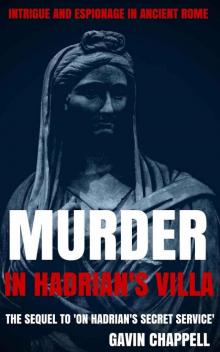 Murder in Hadrian's Villa
Murder in Hadrian's Villa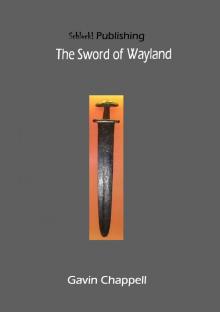 The Sword of Wayland
The Sword of Wayland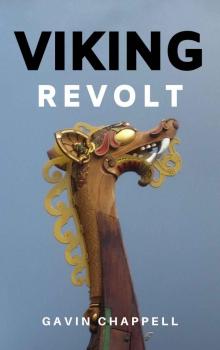 Viking Revolt
Viking Revolt The Londinium File
The Londinium File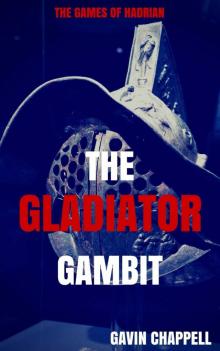 The Gladiator Gambit
The Gladiator Gambit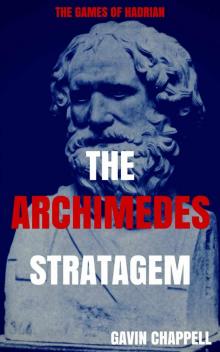 The Archimedes Stratagem
The Archimedes Stratagem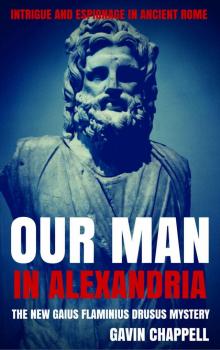 Our Man in Alexandria
Our Man in Alexandria Into the Void (The Dungeoneers)
Into the Void (The Dungeoneers) The Kingdom That Rome Forgot
The Kingdom That Rome Forgot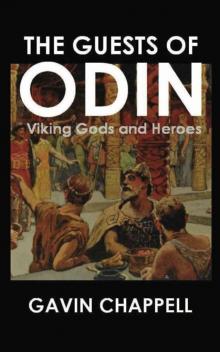 The Guests of Odin
The Guests of Odin